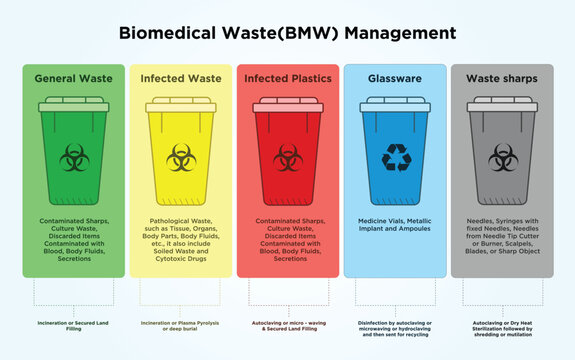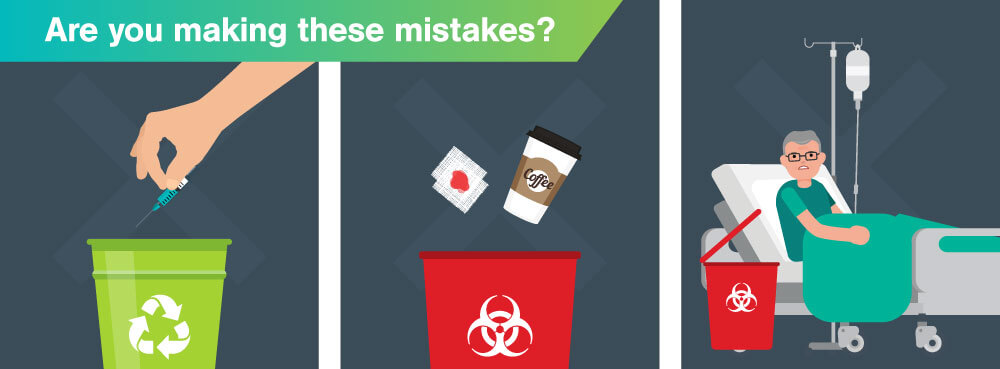Making Sure Safe Handling and Disposal of Medical Waste
Ensuring risk-free handling and disposal of medical waste is of critical significance in health care settings. Improper management of medical waste can position substantial threats to the environment, public health and wellness, and health care employees. This demands adherence to rigorous standards and protocols for its safe handling and disposal. In this introduction, we will check out the value of correct clinical waste monitoring, the threats connected with improper handling and disposal, as well as the guidelines and strategies that can be executed to ensure its safe disposal. Additionally, we will talk about the importance of training and education for health care experts in order to preserve a safe and clean medical care setting. By adhering to these methods, we can successfully alleviate the prospective risks connected with medical waste.
Relevance of Appropriate Medical Waste Monitoring
Correct clinical waste monitoring is of utmost relevance in guaranteeing the safety and wellness of healthcare specialists, clients, and the general public. Medical waste describes any type of waste created by health care centers during the medical diagnosis, treatment, or booster shot of pets or people. This waste can posture major wellness dangers otherwise managed and disposed of properly.
Among the primary reasons why correct medical waste administration is critical is to avoid the spread of transmittable diseases. Medical waste, such as utilized needles, infected dressings, and biological materials, can bring unsafe pathogens. If not taken care of and dealt with properly, these virus can be sent to healthcare workers, individuals, waste trainers, and also the public, leading to the prospective outbreak of illness.
In addition, proper medical waste monitoring helps safeguard the atmosphere - medical waste disposal service. Clinical waste has hazardous materials, including chemicals, pharmaceuticals, and radioactive substances. When not managed appropriately, these substances can infect soil, water bodies, and the air, presenting a substantial hazard to ecological communities and public wellness
Furthermore, efficient clinical waste monitoring makes sure conformity with neighborhood laws and worldwide criteria. Governments and governing bodies have actually developed protocols and standards to make certain the secure handling, storage space, transportation, and disposal of medical waste. Sticking to these guidelines is vital to stay clear of legal consequences and maintain the online reputation and reputation of medical care facilities.
Risks of Improper Handling and Disposal

Individuals can additionally be revealed to these infectious diseases if medical waste is not appropriately disposed of. For example, if infected needles or various other sharps are not disposed of in designated puncture-proof containers, they may unintentionally prick clients, resulting in prospective infections. If clinical waste is not segregated correctly, there is a risk of cross-contamination in between various types of waste, further increasing the opportunities of condition transmission.
Incorrect disposal of medical waste can also have destructive impacts on the atmosphere and the general public. If clinical waste is not treated and dealt with correctly, it can infect water sources, soil, and air, bring about the spread of illness and pollutants. This can have long-term effects on environments and public health.
Guidelines for Safe Handling of Medical Waste
Executing effective procedures for the safe handling of medical waste is necessary in making certain the protection of health care experts, people, and the basic public. These guidelines are critical in lessening the risks connected with the handling and disposal of medical waste, such as infections, injuries, and ecological pollution.
Most importantly, healthcare facilities have to establish a thorough waste management strategy that adheres to regional, nationwide, and international guidelines. This strategy ought to consist of clear guidelines on waste segregation, product packaging, labeling, transportation, and storage space. It is important to divide various types of waste, such as sharps, contagious products, drugs, and non-hazardous waste, to avoid cross-contamination and promote secure disposal.
Additionally, healthcare workers need to receive extensive training on correct waste handling techniques. They ought to be informed on the prospective threats of clinical waste, the appropriate use of personal protective devices (PPE), and the right treatments for handling, transferring, and disposing of different types of waste.
Additionally, health care facilities must regularly monitor and audit their waste management practices to guarantee compliance with standards. This includes carrying out routine examinations, assessing waste handling treatments, and supplying comments and training to employee.
Reliable Approaches for Garbage Disposal
To make certain the risk-free handling and disposal of medical waste, it is necessary to utilize efficient techniques for waste disposal. Clinical waste can posture considerable threats to public wellness and the setting if not dealt with and dealt with correctly. Healthcare centers and waste management companies should implement ideal methods to mitigate these threats.
It involves dividing various types of clinical waste based on their characteristics. Health care centers should supply clear guidelines and training to team members on exactly how to set apart waste correctly.

Additionally, health care centers need to team up with licensed waste management business to make sure correct disposal of clinical waste. These firms have the knowledge and devices needed to securely take care of and get rid of of clinical waste in conformity with laws and ideal practices.
Training and Education for Health Care Professionals
Health care experts play an essential duty in making certain the secure handling and disposal of clinical waste via detailed training and education and learning. It is necessary for doctor to have a deep understanding of the possible dangers related to medical waste and the proper protocols for its monitoring. By obtaining appropriate training, health care professionals can minimize the possible transmission of contagious illness, prevent ecological contamination, and secure both themselves and the public.

Moreover, training programs ought to stress making use of individual protective devices (PPE) and correct hand hygiene methods when dealing with medical waste. medical waste disposal. Medical care professionals must recognize how to properly dispose and utilize of PPE to shield themselves from potential exposure to harmful products. They should likewise be informed on the relevance of regular handwashing and the proper use hand sanitizers to decrease the spread of transmittable diseases
Continuing education and learning and normal updates on medical waste administration techniques are important for medical care professionals. As guidelines and standards progress, it is vital to keep health care service providers notified concerning any adjustments in protocols and finest techniques. This will certainly ensure that they stay updated and preserve a high criterion of safety and security in disposing and dealing with of clinical waste.
Verdict
In final thought, proper handling and disposal of medical waste is critical to make certain the security of healthcare professionals, people, and the atmosphere. By adhering to these practices, we can minimize the possible dangers linked with medical waste.
Medical waste refers to any kind of waste produced by healthcare centers during the medical diagnosis, therapy, or immunization of pets or people. If medical waste is not set apart correctly, there is a threat of cross-contamination in between different kinds of waste, further raising the possibilities of condition transmission.
It is crucial to separate various kinds of waste, such as sharps, contagious materials, drugs, and non-hazardous waste, to prevent cross-contamination and advertise safe disposal. WasteX Medical Waste Disposal.
To ensure the risk-free handling and disposal of clinical waste, it is important to use effective techniques for waste disposal. In addition, healthcare facilities need to establish a routine waste collection and transport timetable to prevent waste accumulation and decrease the risk of accidents or contamination.